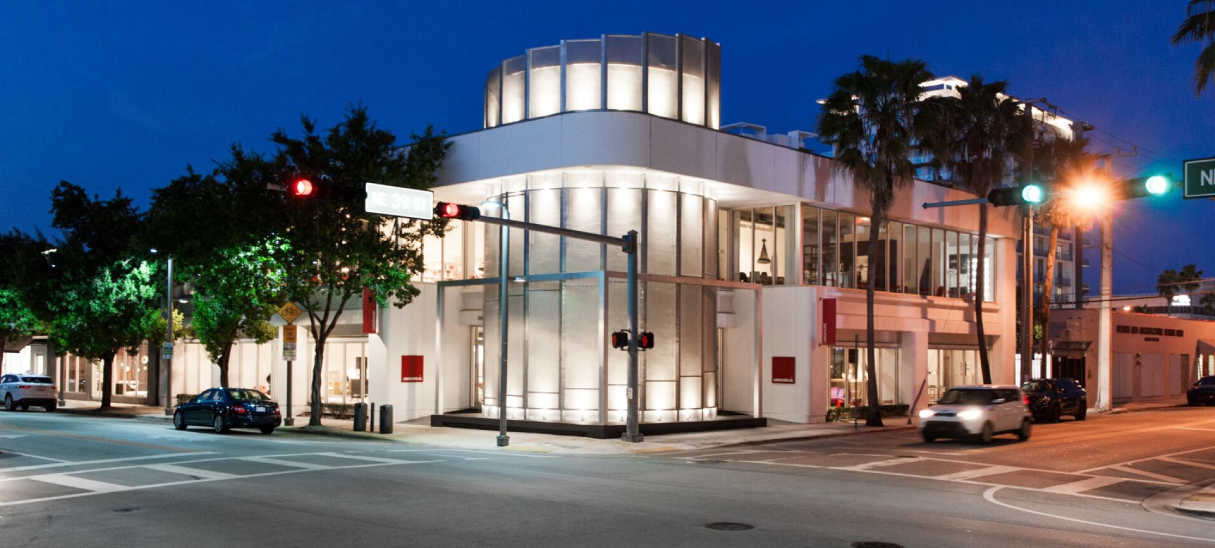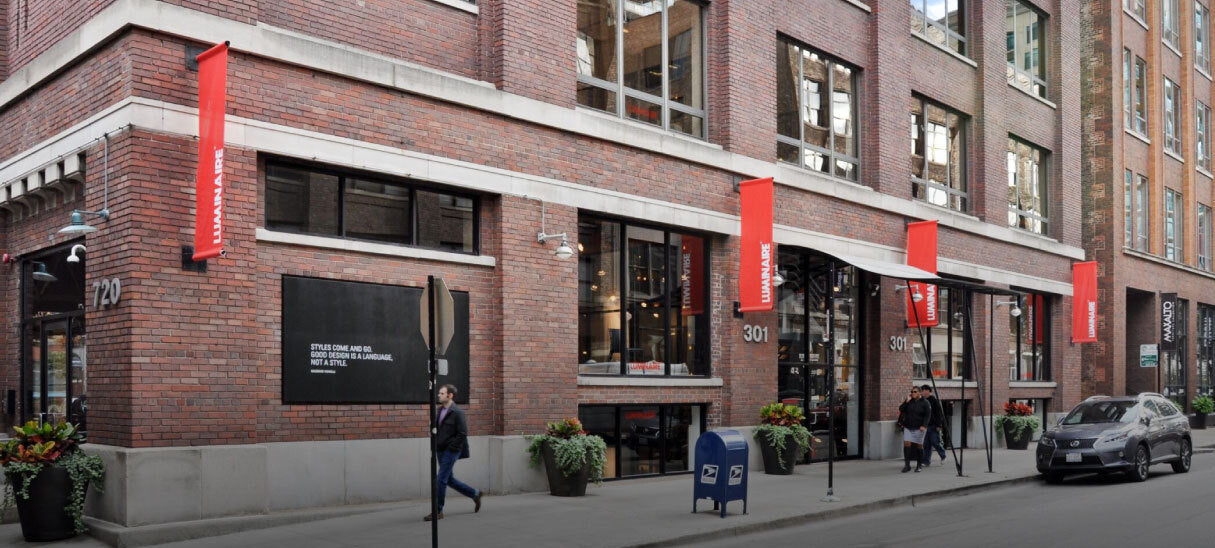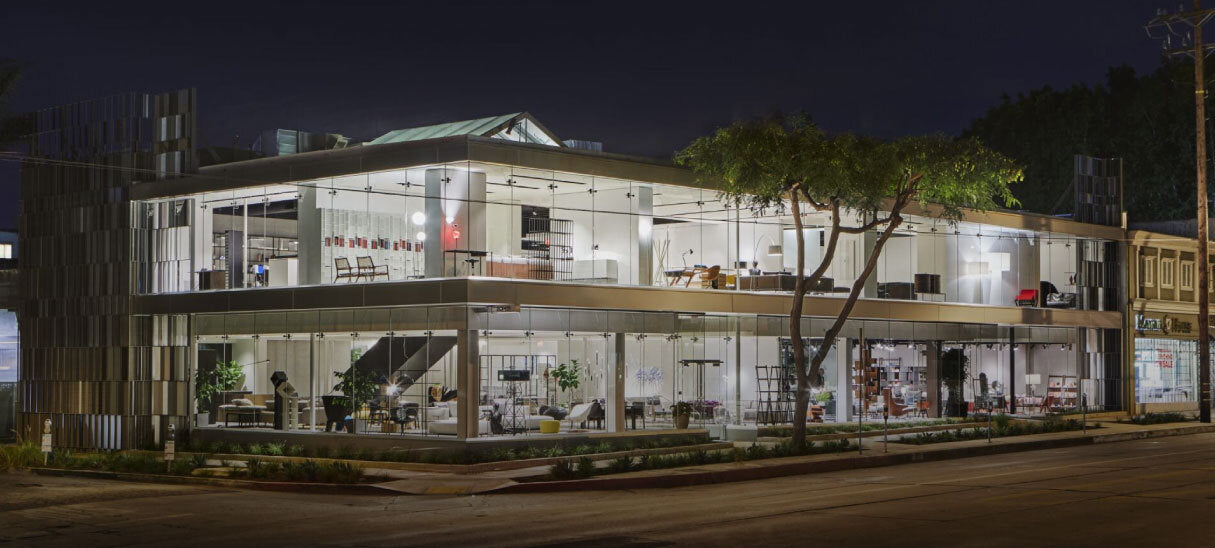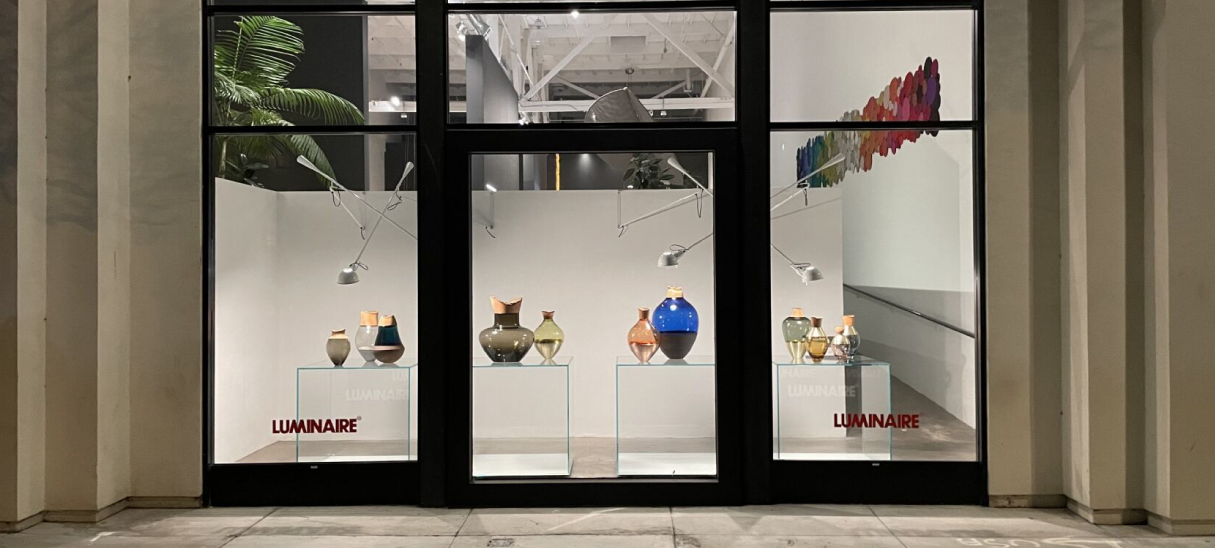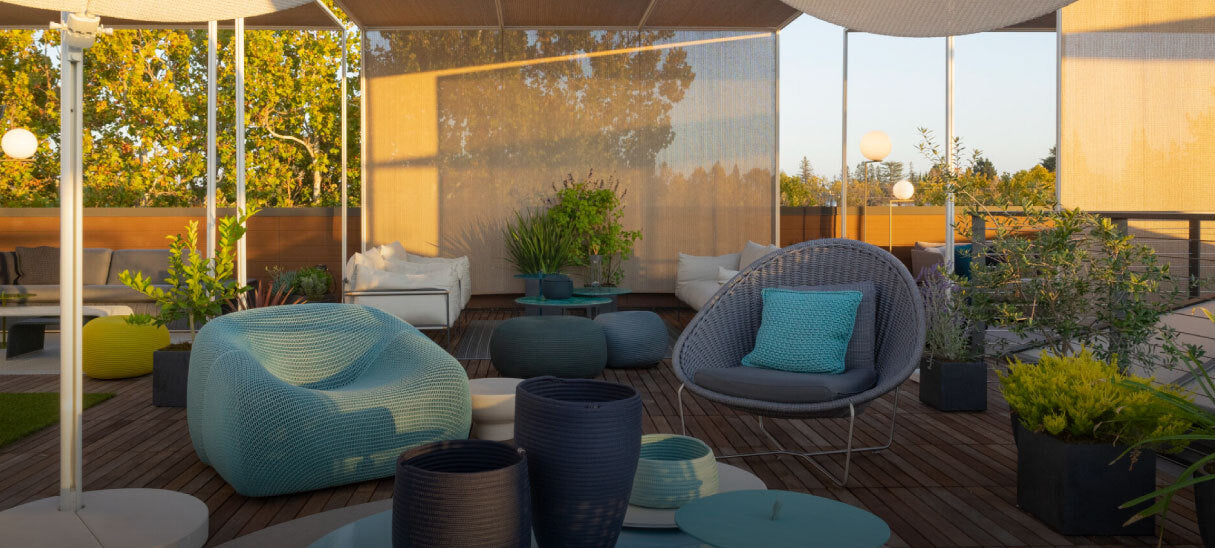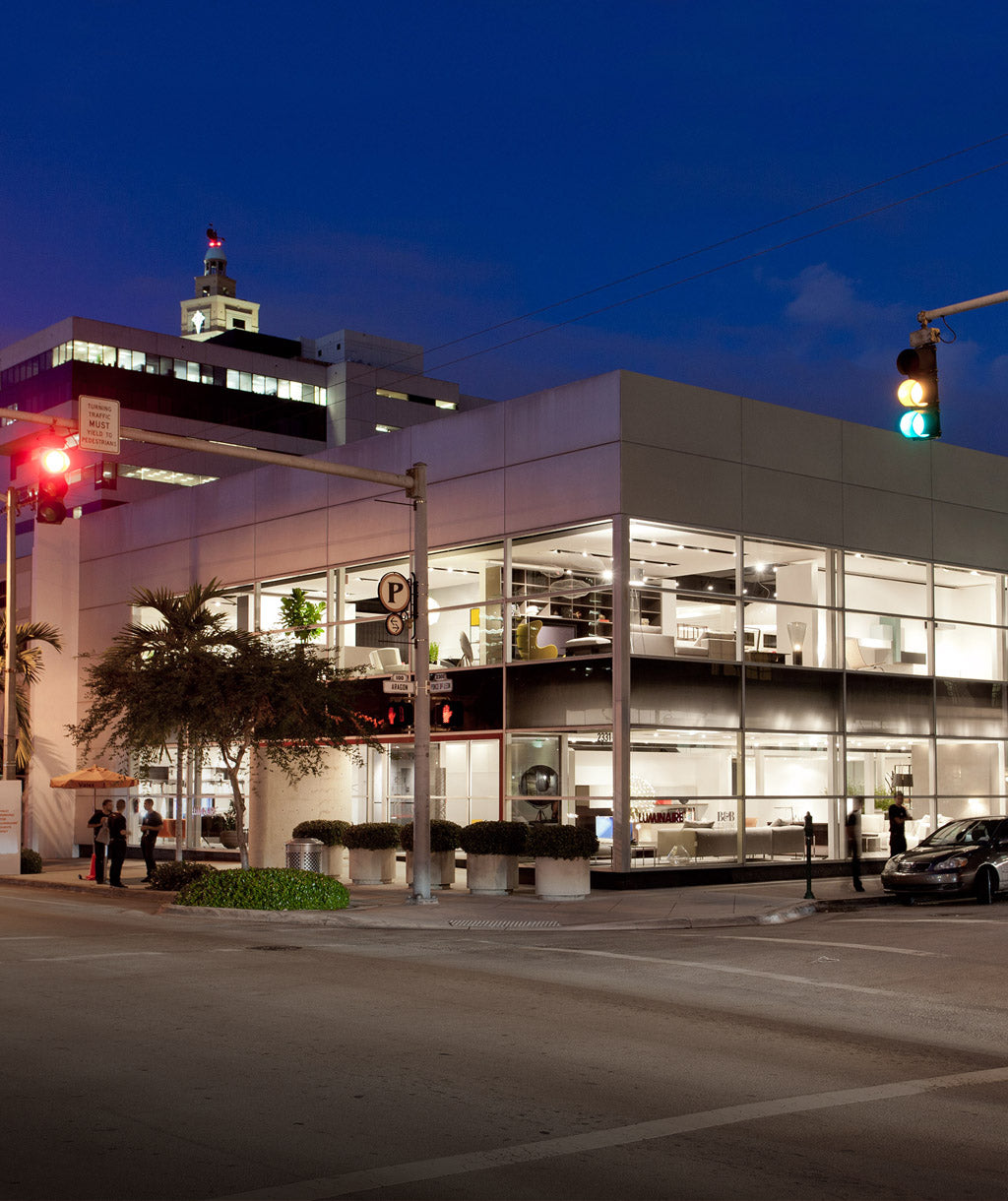Originally published on October 12, 2020 at Coral Gables Magazine. Story by Doreen Hemlock
Since the Launch of their Coral Gables “Church” of Good Design – aka Luminaire – Nargis and Nasir Kassamali Have Become International Arbiters of Well-Curated Objects that Enrich Our Interior Environments
In the world of interior design, many shops have come and gone in Coral Gables. But one downtown showroom stands out as an icon since 1976: Luminaire, a testament to the vision of its immigrant founders, a husband-wife team recognized around the globe as game changers and legends in design. Since he was a teenager, co-founder Nasir Kassamali dreamed of creating a “church” of good design – a place where visitors could see well-executed works, learn about their makers, hear lectures, read books and otherwise savor the beauty of tables, chairs, lights, sculpture, painting and contemporary objects. Nasir bonded with his wife, Nargis, on a college trip to Denmark to study design, and the couple has been transforming that dream into reality ever since.
Indeed, the Kassamalis and their shop are so well regarded that when their first California locale opened in 2018, the Los Angeles Times penned this admiring headline: “Luminaire expands to L.A. (finally).”
A SANCTUARY TO DISCOVER OUR “THIRD SKIN”
As soon as you enter Luminaire on Ponce de Leon Boulevard, you feel the sense of sanctuary and peace. There’s a gentle fragrance of tea in the air. Calming, instrumental music plays on a high quality sound system. Natural light flows into every room, some through the high peaked glass ceiling at the central atrium.
The quiet, open space lets you contemplate the objects, many one-of-a kind or limited editions. Most pieces carry no price tag, so the well-versed staff can share stories about the works and their creators.
The Kassamalis say Luminaire has stood the test of time because their mission is to study, educate and share design, not just sell it. The couple organizes lectures by top designers at Luminaire locales. They sponsor young designers at museums. Nasir serves on juries at design fairs worldwide. And in recent years, they’ve auctioned off pieces made by designer friends for charitable causes, donating over $1 million to the University of Miami’s Sylvester Comprehensive Cancer Center alone.
Further proof of their commitment to design: The warehouse corporate headquarters they opened in Doral in 2000 won awards for excellence from top architecture groups. “We’re not in the furniture business,” says soft-spoken Nasir, whose design opinion is sought out by artists and critics in Europe, Asia and beyond. “We create environments that improve people’s lives.”
For the Kassamalis, design is a language, a philosophy and a way of life. Nasir describes the objects that we choose to surround us as our “third skin.” Our first skin is the one on our bodies, which can be pinched or caressed. The second is our clothes, which can be sensual, if we so choose. (The couple often wears Japanese designer fashions, made with top quality materials in solid colors in unusual geometries). Our “third skin” of well-curated objects, like a serene bedroom or the interior of a fabulous car, can touch our souls and inspire silent reflection.

“When you are in silence, you can hear your own breath and hear your heart beat, and that’s the closest you can be in peace with yourself,” says Nasir. He likens inspiring design around us to “the religion of now” and a well-designed space to the chance “to experience heaven when you are still alive.”
BUILDING RELATIONSHIPS AT LUMINAIRE
For visitors to Luminaire, “heaven” often begins with a cup of espresso coffee, served with three cubes of sugar perfectly placed and a tiny cookie on the side. The staff strives to engage, so customers leave more informed about designers, with the objects acquired evoking the meaning and experience that the customers seek. “It’s not a transaction. It’s a relationship,” says Nargis.
Extroverted Nargis leads in-store efforts in Coral Gables, overseeing a team of 10, including architects and designers. The staff is trained to be customer-focused and gracious. On average, each has spent a decade with the firm. They’ve built such strong ties, she says, that some clients drop by to share pastries; others invite the Kassamalis to weddings in Florida and overseas.
“Seventy percent of our business is from clients who have bought from us before,” says Nasir, a self-described introvert. “And even though they might finish their home with us, they continue to come … just to see what is new, maybe to buy a gift for somebody, or even just to say hello.”
Nargis says she’s come to appreciate and nurture relationships and kindness more, as a result of her repeated bouts with cancer since age 36. “Cancer has taught me to be a better person,” she says.
The couple also cultivates relationships with designers and other suppliers, becoming personal friends with such luminaries as Italian architect Piero Lissoni, Brazil’s furniture prodigy Jader Almeida and Germany’s lighting innovator Ingo Maurer. Their tight bond with the founder of the B&B Italia furniture brand, Piero Ambrogio Busnelli, led to Luminaire becoming the brand’s exclusive retailer in the United States. Today the B&B Italia line occupies a dedicated space on the first floor of the Gables showroom.

FROM EAST AFRICA VIA SCANDINAVIA TO SOUTH FLORIDA
All that is a long way from the Kassamalis’ roots in eastern Africa. Nargis was born in Tanzania and Nasir in Kenya, both children of families originally from India. The two met at the University of Nairobi, fell in love during their study trip to Denmark, and later moved to South Florida thanks to a friend who lived in the Coral Gables area.
Nasir traces his love of design partly to his father. His dad owned an electricity business and installed power systems in homes and buildings. From an early age, Nasir took an interest in the firm’s wood-working shop. He tagged along with his dad to meetings with architects, fascinated by their talks on design. When his dad gave Nasir a book on the Bauhaus movement, the teen began dreaming of his “church” of good design – the idea that prompted the first Luminaire store, which opened in 1974 in a strip mall in North Miami Beach. It was a tiny shop that offered only contemporary Danish lighting.
The couple expanded to Coral Gables in 1976, starting out in a clothing shop on Miracle Mile, offering a wider variety of items that drew local architects and university professors. In 1984, they debuted their current showroom building, designed by Mateu Architects, on the site of a former movie theater. The corner building has repeatedly won the Test of Time award from state and local architect groups.
“They were visionary in designing a modern, glassed building, not highly ornamented, to reflect their design philosophy and the contemporary products they sell,” says Coral Gables architect Nati Soto, former president of the Florida and Miami chapters of the American Institute of Architects.
Luminaire’s hand-picked furniture and accessories also stand the test of time, says interior designer Ivette Arango of Coral Gables. She often takes clients who like clean, modern, original, high quality design to shop at the store. And in her own conference room, she features a set of plexiglass, swivel chairs she bought at the showroom decades back, which she continues to love – and recently reupholstered.
“They have a good formula, because I don’t believe there’s a store that competes with them in unique designer pieces that aren’t available [elsewhere] in South Florida,” says Arango. “They’re like the Marlborough Fine Art Gallery. If you get in, you’re up there. You’re sitting together with the masters.”
EXPANSION TO NEW YORK, MILAN AND BEYOND?
Today, Luminaire operates three South Florida locales: The Coral Gables flagship, their Doral headquarters and a Design District lab that offers exhibits and talks. It also has a longstanding Chicago showroom and its new Los Angeles locale, employing 80 people across all of its sites.
But there are plans for significant expansion, since the couple in 2017 sold a major interest to Haworth, a privately-held, family-owned furniture company based in Michigan. Haworth hopes to open Luminaire stores in New York, Milan, Paris and other cities known for contemporary design, says Nasir.
The Kassamalis, now in their 70s, continue to lead Luminaire’s design choices, applying relentlessly high standards. (They also retain ownership of the Gables property and other real estate). A tour of the showroom reveals how varied and demanding their choices are – from works by younger craftsmen to iconic pieces from 20th century masters.
One recent find: A sculpture by German artist Christoph Finkel (born 1971), who is known for shaping heavy, raw wood into bowls and other forms that “evoke the feeling of a tree trunk,” says Nasir.
Among the table lamps: The Poul Poul, designed by the late Ingo Maurer and Dagmar Mombach (born 1958). They were influenced by the late Japanese-American sculptor Isamu Noguchi and his use of folded paper. Light moves subtly through the lamp’s handmade, hand-pulled paper “like a sailboat,” Nasir explains.
“We don’t sell this. We don’t want you to buy it. We want you to acquire it. Because when you acquire something, part of the artist is coming to you or coming with you,” says Nasir. “And if you take care of it well, it could be considered an heirloom, right? And your grandchildren or great-grandchildren will understand your taste, silently, without you having to tell them.”
October 12, 2020


